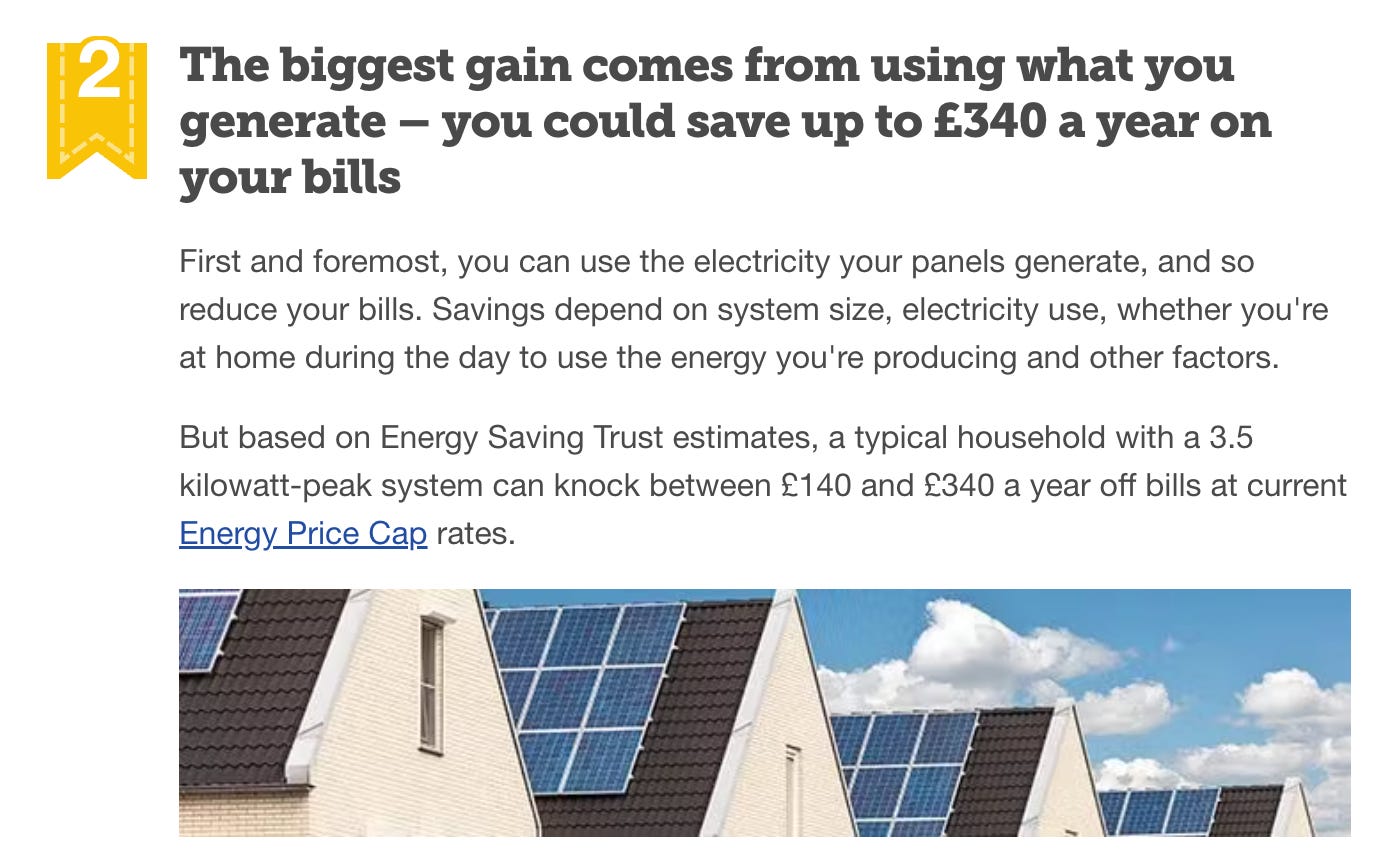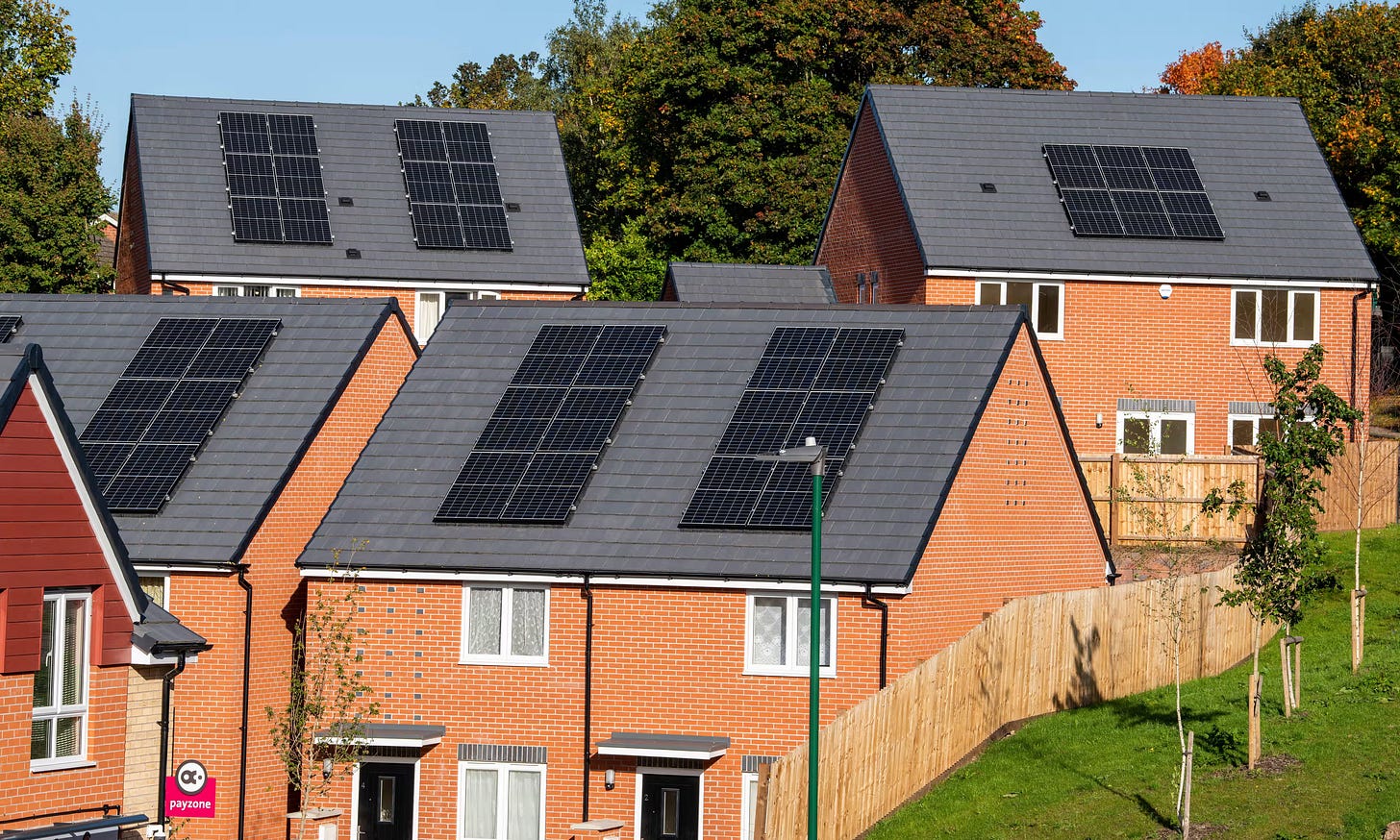Dim
A mandatory solar panel installation will cost a young house buyer over £19,000 and take them nearly 60 years to pay for.
THE UK LABOUR Government has announced that it’s moving forward with its experiments to dim the sun, an odd goal in a country in which around 16,000 people die each winter because the sun is too dim.1 The initial cost to the taxpayer of this outrageous violation of our right to informed consent is an estimated £50 million, to be overseen by the £450,000 a year CEO of a shadowy taxpayer funded government research outfit called Aria.
To take advantage of the dimmed sun, Labour has also announced that it’s mandating the installation of solar panels on all new-build homes in England by 2027. In this week’s short essay, we ask a penetrating question: “Is this a Good Thing?”.
To answer it, we’ll address it from the perspective of a young couple struggling to finance their first home, and work out how much it will save them.
According to Energy Saving Trust, the average installation size for a modest home is around 3.5 kilowatts peak (kWp). Installing the panels, inverter, mounting system, and wiring and electrical components will cost between £6000 to £8000. They’ll need a battery—that’s around £5000. Let’s assume the builder can do the lot for £10,000.
That increases the purchase price of the home for our young couple by £10,000. Added to a 30 year, 5% mortgage, the total cost to them of their now mandatory solar gadget is £19,324 over the life of the mortgage.
EST tell us how much a 3.5 kWp solar panel installation will save on annual energy bills. It’s between £140 and £340 a year. Let’s be optimistic and assume £340. That gives a payback period on the £19,324 installation cost of 57 years in nominal terms (there are more sophisticated ways of computing this, but it really doesn’t matter).

A 57 year payback period is almost twice the period of the mortgage and three times the economic life of the panel. As they enter retirement, our young couple will still be paying for solar panels that went to landfill 40 years earlier.
This cost excludes the regular replacement costs of the inverter and battery when they fail. Meanwhile, the UK’s Royal Society estimates the cost of installing sufficient long term grid storage to prevent Iberian Peninsula style renewables blackouts at around £1 trillion for a hydrogen system—battery storage is an order of magnitude greater.2 That will go on to our young couple’s electricity bills as part of their toxic cocktail of “renewable” energy subsidies, taxes and levies.
All this in a country with a housing affordability crisis, some of the highest renewables-subsidy driven electricity prices in the world, energy price induced industrial contraction, a debt to GDP ratio of 100% and rising, and a budget deficit this year equivalent to 9% increase in the tax rate.
So, no: Not a Good Thing. But you knew that already. It’s “Net Zero”.
This is the so-called “excess winter mortality”: the amount by which UK deaths rise in the winter relative to summer.
Llewellyn Smith, C. (2023) Large-scale electricity storage. The Royal Society. Available at: https://royalsociety.org/news-resources/projects/low-carbon-energy-programme/large-scale-electricity-storage/



We've had solar panels since 2011, on our north south facing roof, purely to take advantage of the feed in tariff. We got in just before it was changed and make a tidy sum. Except last year. On taking the reading in June hubs asked "did I do this already?" I replied no. He said the reading was extremely low. I had to remind him the first 4 months of the year had been wall to wall grey cloud, zero sun. I certainly wouldn't want to rely on them for my electricity! Not in this country.....Oh and when we first put them up, every man and his dog suddenly wanted to buy our roof space....
Knowing very little (to be truthful, nothing) about solar panels I wondered about their lifespan. I do have anecdotal knowledge of the quality of some new-build housing and certainly would not trust all builders to install panels of the highest quality. When maintenance costs etc are factored in, I cannot imagine that I would rush to buy a new-build property. If I hear of someone in the family contemplating such a move, I’ll forward this article to them with all due speed.